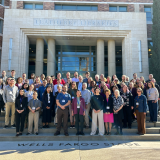Graduate Students Provide Therapy Services with Community Clinic
October 24, 2011
The scruffy donated furniture has been tossed. The one-way mirror installed decades ago is history. Even the old name was scrapped.
But at Saturday’s opening celebration of the Frances Smith Center for Individual and Family Therapy at Chapman University, the founding principles of community service and hands-on teaching planted in the clinic’s beginnings 46 years ago were still in strong evidence. Hundreds of alumni, friends, faculty, staff and supporters gathered at a festive afternoon event to celebrate the clinic’s new home in Crean Hall. Particularly special to many was the guest of honor – Frances Smith, Ph.D., professor emerita.
“We’re really standing on the shoulders of a giant here,” Brennan Peterson, Ph.D., director of the Marriage Family Therapy Program in the Crean School of Health and Life Sciences, said during his introduction of Dr. Smith, for whom the mental health facility is named.
Dr. Smith, who at 96 is still a practicing therapist, spoke to the audience , recalling that the impetus for the clinic’s founding came from students who wanted the opportunity for clinical experience on campus. She recounted how she hired a bus and took students on a tour of area counseling clinics. At the tour’s conclusion, “We decided that maybe we needed to do our own clinic at Chapman,” she said.
A cornerstone of that early clinic that continues today was on-site supervision of graduate students enrolled in the MFT program. The majority of California MFT programs send their students to community clinics to perform the mandatory face-to-face clinical training with clients, leaving the bulk of the supervision to staff at those clinics and requiring only periodic reports to faculty. Dr. Smith believed students would be better served by a program that allowed for supervision by faculty. At Chapman that supervision was often even live, thanks to that first one-way mirror tucked into a corner room of Smith Hall.
Prior to Saturday’s celebration, Dr. Smith sat with a former student, Jeanne M. Walker, Ph.D., head of the university’s Student Psychological Counseling Services, and talked about the value of on-site supervision. “Whatever they were doing in training and learning to be counselors, they were getting one-on-one supervision. And through a one-way mirror, for heaven’s sake. It’s very important,” Dr. Smith said.
The on-the-spot supervision continues to be a distinctive aspect for the Chapman clinic, Dr. Walker said.
“That still is a very important and unique part of this program. It’s what sets this program apart from others,” Dr. Walker said.
In the new center, formerly known as the Chapman University Community Clinic and later as the Frances L. Smith Community Clinic, MFT students and faculty have the use of eight consultation rooms, six of which are equipped with one-way mirrors and audio monitoring and all of which have digital taping equipment for recording of therapy sessions.
Dr. Smith admired the clinic’s growth and state-of-the-art facilities – “It’s fantastic” – but also emphasized that the heart of the work, offering low-cost and accessible counseling to the community, is unchanged.
“There’s still a need for viable mental health services,” she said.

